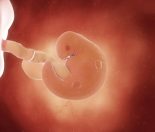In association with professional midwife experts at birthEd, find out everything you need to know about pregnancy at 1 week, including how your baby is growing, changes to expect in your body and pregnancy health, nutrition and wellness advice.
| All weeks |
Week 2 |
1 Week Pregnant – Your baby, your body & you
Making a Baby
The probability of conception is estimated at less than 40-50% per menstrual cycle. In over 200 million sperm, only one or maybe two extra lucky, healthy and fit sperm will fertilize your egg.
The number of fertile days in a woman’s cycle is unknown however it is believed that ovulation generally occurs between days 14-16 of a woman’s menstrual cycle (counting the first day of her period as the first day of the cycle).
Ovulation occurs when your egg is released by your ovaries and begins to travel down your fallopian tube towards your uterus. Your egg lives for about 12-24 hours and pregnancy is most likely to occur from sex that happens during the six day period before and ends on the day of ovulation, so … if you’re there, it’s time for action.
Sperm can live for up to 5 days and so if you’ve had sex in the days before ovulation, the sperm will travel up through the uterus and wait for your egg.
Fun Facts
- It does not make any difference what position you have sex in, in determining what gender your baby will be
- It is also uncertain as to whether the timing of intercourse will determine the likelihood of whether you have a boy or a girl. Various studies have come up with contrasting results1.
- Some research suggests your egg chooses which sperm2
- Your cervical (vaginal) mucous thins and becomes clear, stretchy and jelly-like and has the consistency of egg whites in response to your increased estrogen two days at the time of ovulation. This mucous helps the sperm to swim towards the egg.
- The normal sperm count ranges from 15-200 million per milliliter of semen and the amount of ejaculate ranges from 1.5-7.6mls
- Twins are conceived in around 1 in 80 pregnancies, excluding in-vitro fertilisation3. In 2015 in New Zealand, multiple births accounted for 1.39% of all births.
Preparing for conception
Some do’s:
- If on any medication, check with your GP whether it’s ok to continue taking during pregnancy
- Wash hands after contact with cat litter or animals
- Aim for 8 hours sleep a night
And don’ts:
- Drink alcohol from the moment you know you are pregnant
- Don’t overdo strenuous exercise. Intense exercise of more than five hours a week has been associated with a decrease in ovulation
Your Baby
You are not yet pregnant however we count gestation from the first day of your last period.
Your Body
Preconception Health (PCH) is your health before you become pregnant and encompasses being healthy and living well and is a precious gift to your baby. It matters, and it can have an effect on the development and health of your baby.
Over the next couple of weeks we will discuss some of the essential factors of your preconception and conception health so that you can give your baby the best start.
Smoking: Quitting smoking, or vaping, before becoming pregnant would be the most important thing you could do to protect your baby from the serious complications of cigarette smoke. Cigarette smoke contains an estimated 3800 chemicals and even breathing secondhand smoke can affect your developing baby. Nicotine can permanently damage a baby’s developing brain and organs and newborns have been shown to have the same nicotine levels as their mothers and suffer withdrawal symptoms after birth.
Women who smoke are more likely to have a longer labour, a smaller baby, a placental abruption and a post partum haemorrhage. Your baby has an increased risk of dying suddenly (SUDI – Sudden Unexpected Death in Infancy), having colic, asthma, ear infections, and becoming obese.
Quitting means that you are more likely to conceive, and less likely to suffer a miscarriage, extopic pregnancy or a preterm labour and birth of your baby. In New Zealand we have some incredible support agencies and tools. Contact or visit Quitline on 0800 778 778 or visit to learn more about these services.
Find out more about Preconception care.
Find out more about Understanding conception.
Folic acid
Research provides strong evidence to support the importance of increasing your intake of folic acid (a common B vitamin, B9) before becoming pregnant and during the first 12 weeks of pregnancy to reduce neural tube defects (NTD’s) in babies. Spina bifida is the most common type of NTD and occurs when the spine and spinal cord and supporting tissue don’t form properly in early pregnancy. In the first 28 days after conception, the neural tube develops into the baby’s brain and spinal cord.
Babies born with spina bifida are affected for life and symptoms can be mild to severe and will depend on the type of defect. It is usually diagnosed before your baby is born during your 18-20 week anatomy scan. About 1 in 1000 pregnancies are affected.
You can reduce the chances of your baby having a spinal tube defect, by taking one folic acid 800 microgram (mcg or ug) tablet every day until the end of week 12. You can also increase the folate in your diet by eating foods rich in folic acid. These include dark green leafy vegetables (spinach, broccoli, romaine lettuce, asparagus, brussel sprouts), eggs, sunflower seeds, whole grains and some fruit.
You
Buy a journal.
Journaling is known for its multitude benefits from supporting us to be more mindful and helping us connect more to our thoughts, values and emotions.
This has been shown to help us feel happier. We can be more objective and get a deeper perspective of ourselves and our thoughts when we ‘get it out of our head’ and onto paper.
Journaling through your pregnancy and during the process in becoming a mother is a wonderful way to document your journey. This is for you. This is for your thoughts, feelings, experiences, notes and lists.
- Empty out your brain before you go to sleep
- Take notes in appointments
- Plan and prepare
- What are you grateful for?
- Check in on your long term and short-term goals. What is it you want to achieve this week? What is one thing you’re going to do for yourself today?
Your Relationships
Schedule some time to spend together – sometimes we need to actually diary time together.
What are some of the things you enjoy doing with each other? Come up with 3 creative activities each that do not involve alcohol, write them on a piece of paper and pop them in a jar. Come date night, take a turn choosing the activity and have fun!
This Week’s Preparation
Track your menstrual cycle – download an app like M.P.T or Flo to help you
Stop smoking, vaping, drinking and using drugs – Call Quitline on 0800 778 778 or visit Quit.org.nz to find out about these services.
Stop drinking alcohol – if you are trying to get pregnant it is highly recommended that you avoid alcohol.
Start taking a prenatal vitamin and additional folic acid if there isn’t 800mg in your vitamin
Cut back on your caffeine intake
Increase your consumption of fruit and vegetables and cut back on sugar and fat
Get enough sleep!
Move your body and exercise each day
For him: All of the above and keep your scrotum cool. Heat slows down sperm production and so avoid hot baths, tight pants and wear boxers instead of briefs!
Buy a journal
Back to 52 Weeks of pregnancy.
Research
Timing of sexual intercourse in relation to ovulation – effects on the probability of conception, survival of the pregnancy, and sex of the baby. New England Journal of Medicine, vol. 333, issue 23 (1995) pp. 1517-1521
1“Shettles and Rorvik recommend that couples who wish to have a boy should time their intercourse to coincide with ovulation, with up to 85 percent success claimed for the selection of boys and 80 percent for the selection of girls. In contrast, Zarutskie et al. concluded in their review of the published literature that if there is any tendency, it is for more females than males to be conceived when coitus occurs close to ovulation.”33
2 https://www.quantamagazine.org/choosy-eggs-may-pick-sperm-for-their-genes-defying-mendels-law-20171115/
3. ‘The New Zealand Pregnancy Book: A Guide to Pregnancy, birth and a baby’s first three months’ – Sue Pullon and Cheryl Benn; 2016 Edition
http://www.adhb.govt.nz/newborn/Guidelines/Neurology/NeuralTubeDefects.htm
https://www.hsph.harvard.edu/nutritionsource/folic-acid/
https://www.ninds.nih.gov/Disorders/Patient-Caregiver-Education/Fact-Sheets/Spina-Bifida-Fact-Sheet







